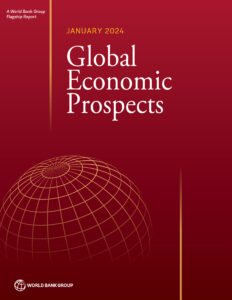ASTANA – In 2023, economic growth in Europe and Central Asia surged to 2.7% compared to 1.2% recorded in 2022, marking a rebound attributed to the expansion of domestic demand, stable market conditions in the labor market, and the resumption of growth in the Russian Federation and Ukraine, according to the World Bank’s Global Economic Prospects report for January.

Photo credit: GEP 24a Front Cover
The report projects economic activity in Europe and Central Asia to slow down to 2.4% this year, followed by an upward trend to 2.7% in 2025. The key factors driving this growth include private consumption, supported by reduced inflationary pressures, as well as exports stimulated by the gradual recovery of the economy in the eurozone.
Growth in Central Asia is forecasted to remain relatively stable at around 4.8% annually over 2024-25, the highest growth among subregions. This resilience is attributed to sustained high commodity prices, robust consumer spending amid reduced inflation, and continued export growth driven by the expanding oil production capacity in Kazakhstan.
The regional economy faces vulnerability in case of a weaker-than-expected recovery in the euro area, a crucial trading partner for the region. This scenario, alongside geopolitical risks, would likely have adverse effects on regional economic activities.
Meanwhile, global growth is projected to slow for the third year in a row, from 2.6% in 2023 to 2.4% in 2024, the slowest half-decade of GDP growth in 30 years.
“Near-term growth will remain weak, leaving many developing countries—especially the poorest—stuck in a trap: with paralyzing levels of debt and tenuous access to food for nearly one out of every three people. That would obstruct progress on many global priorities. Opportunities still exist to turn the tide. This report offers a clear way forward: it spells out the transformation that can be achieved if governments act now to accelerate investment and strengthen fiscal policy frameworks,” said Indermit Gill, World Bank Group’s chief economist and senior vice president.

